

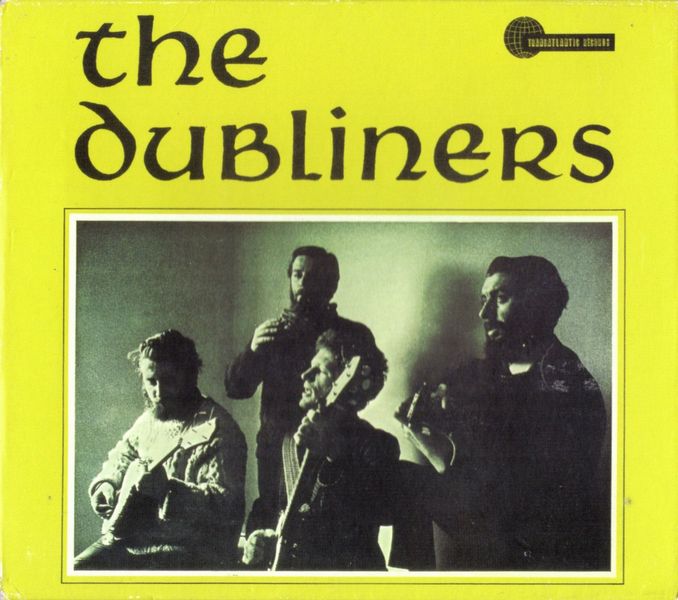 |
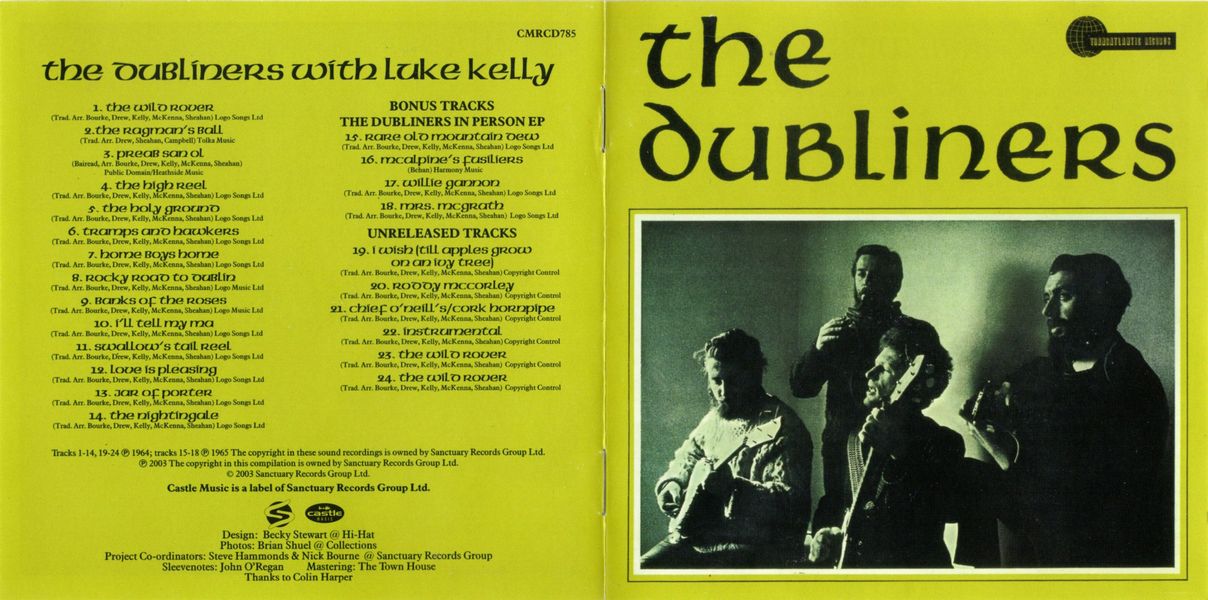
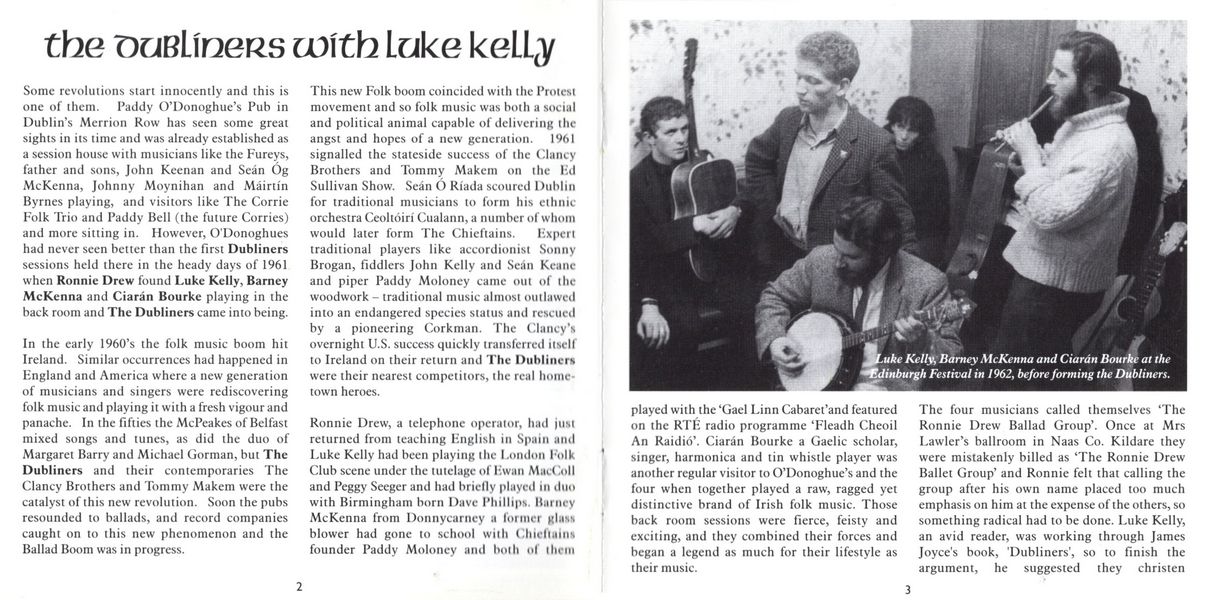 |
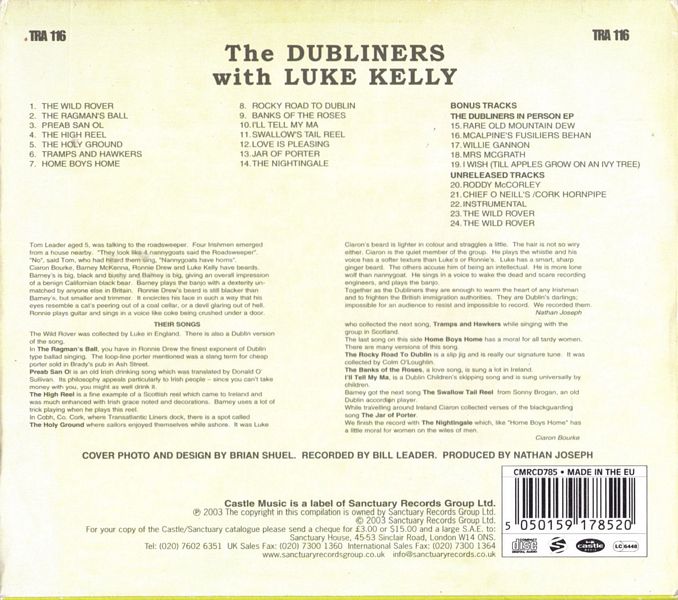
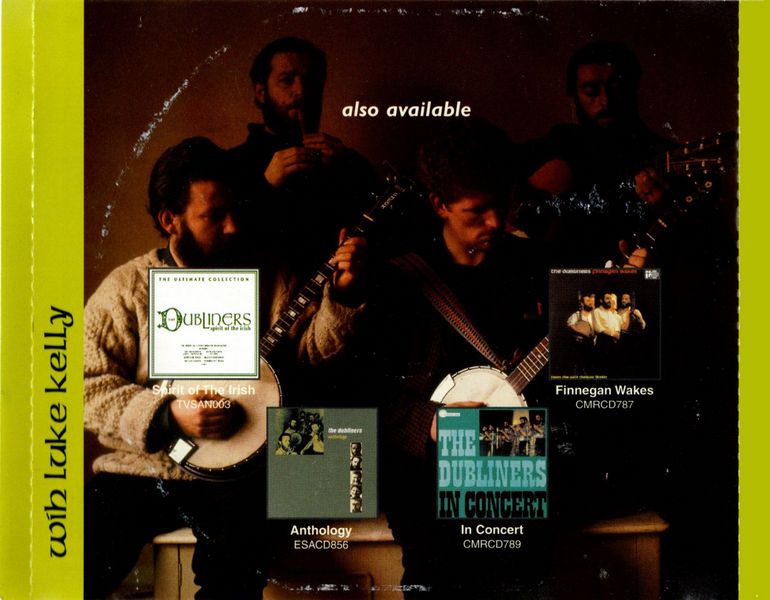
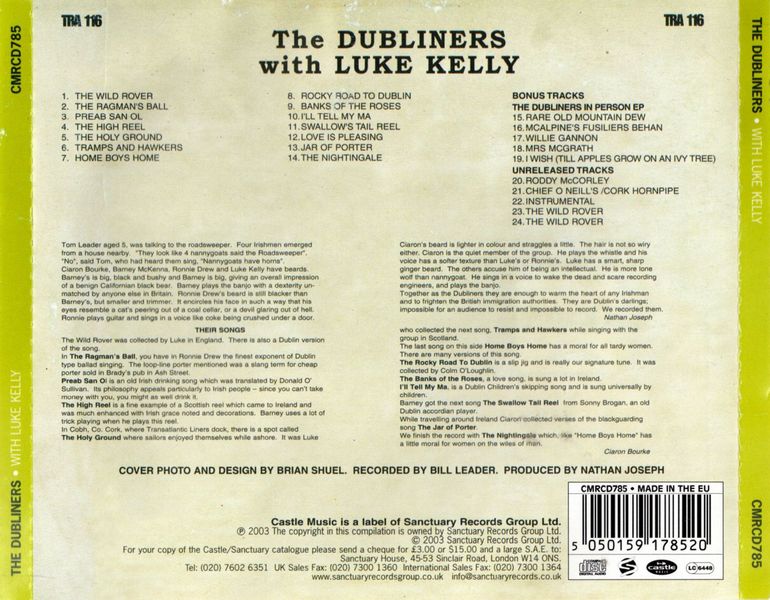
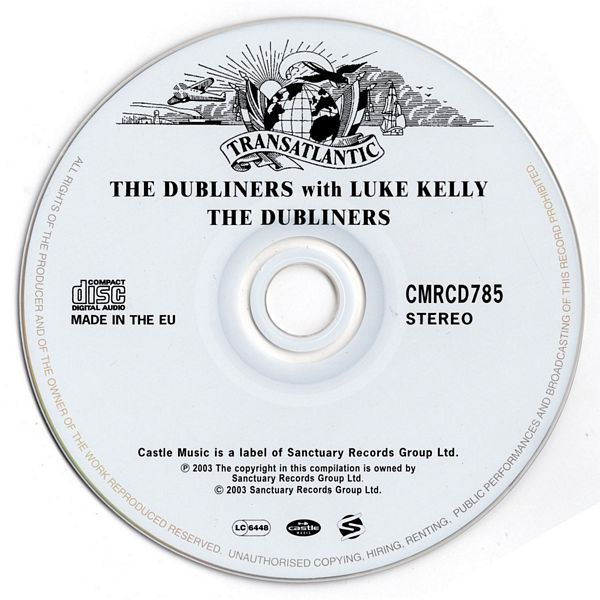
|
| more images |
Sleeve Notes
Some revolutions start innocently and this is one of them. Paddy O'Donoghue's Pub in Dublin's Merrion Row has seen some great sights in its time and was already established as a session house with musicians like the Fureys, father and sons, John Keenan and Seán Og McKenna, Johnny Moynihan and Mairtin Byrnes playing, and visitors like The Corrie Folk Trio and Paddy Bell (the future Corries) and more sitting in. However, O'Donoghues had never seen better than the first Dubliners sessions held there in the heady days of 1961 when Ronnie Drew found Luke Kelly, Barney McKenna and Ciarán Bourke playing in the back room and The Dubliners came into being.
In the early 1960's the folk music boom hit Ireland. Similar occurrences had happened in England and America where a new generation of musicians and singers were rediscovering folk music and playing it with a fresh vigour and panache. In the fifties the McPeakes of Belfast mixed songs and tunes, as did the duo of Margaret Barry and Michael Gorman, but The Dubliners and their contemporaries The Clancy Brothers and Tommy Makem were the catalyst of this new revolution. Soon the pubs resounded to ballads, and record companies caught on to this new phenomenon and the Ballad Boom was in progress.
This new Folk boom coincided with the Protest movement and so folk music was both a social and political animal capable of delivering the angst and hopes of a new generation. 1961 signalled the stateside success of the Clancy Brothers and Tommy Makem on the Ed Sullivan Show. Seán O Riada scoured Dublin for traditional musicians to form his ethnic orchestra Ceoltoiri Cualann, a number of whom would later form The Chieftains. Expert traditional players like accordionist Sonny Brogan, fiddlers John Kelly and Seán Keane and piper Paddy Moloney came out of the woodwork — traditional music almost outlawed into an endangered species status and rescued by a pioneering Corkman. The Clancy's overnight U.S. success quickly transferred itself to Ireland on their return and The Dubliners were their nearest competitors, the real hometown heroes.
Ronnie Drew, a telephone operator, had just returned from teaching English in Spain and Luke Kelly had been playing the London Folk Club scene under the tutelage of Ewan MacColl and Peggy Seeger and had briefly played in duo with Birmingham born Dave Phillips. Barney McKenna from Donnycarney a former glass blower had gone to school with Chieftains founder Paddy Moloney and both of them played with the 'Gael Linn Cabaret' and featured on the RTE radio programme 'Fleadh Cheoil An Raidio'. Ciarán Bourke a Gaelic scholar, singer, harmonica and tin whistle player was another regular visitor to O'Donoghue's and the four when together played a raw, ragged yet distinctive brand of Irish folk music. Those back room sessions were fierce, feisty and exciting, and they combined their forces and began a legend as much for their lifestyle as their music.
The four musicians called themselves 'The Ronnie Drew Ballad Group'. Once at Mrs Lawler's ballroom in Naas Co. Kildare they were mistakenly billed as 'The Ronnie Drew Ballet Group' and Ronnie felt that calling the group after his own name placed too much emphasis on him at the expense of the others, so something radical had to be done. Luke Kelly, an avid reader, was working through James Joyce's book, 'Dubliners', so to finish the argument, he suggested they christen themselves 'The Dubliners'. And so The Dubliners came to be. The sound was raucous yet distinctive with tenor and five-string banjo, guitar and tin whistle backing three strong individual vocalists. It was a raw exciting sound, new and fresh yet immediately accessible.
The quartet soon graduated from pub sessions in The Abbey Tavern in Howth, the Old Sheiling in Raheny, The Royal Marine Hotel in Dun Laoghaire and Mick McCarthy's famous 'Embankment' in Tallaght to larger venues. Peggy Jordan who was running late night folk concerts at The Grafton Cinema was so impressed she engaged them for her midnight shows. The Dubliners domestic success was quick and immediate. They were on the ground gigging regularly and developing a fanatical following. The Dubliners hit at a winning formula much to their own bemusement; their beards and gruff Dublin accents and humour endeared them to diverse audiences. They became popular in Britain during the folk revival. They were the first ballad boom group to introduce Irish dance tunes into their repertoire, highlighting an outlawed aspect of Irish popular music of the time.
The Dubliners earliest recordings included appearances on compilations like 'Folk Festival-Festival Folk', 'Hootenanny' and 'Irish Folk Night' sharing spaces with other aspiring young folkies. Their first big break came when they met Nathan Joseph, owner of Transatlantic Records, at the Edinburgh Festival in 1963. Adding The Dubliners to the Transatlantic stable proved worthwhile as, along with the Ian Campbell Folk Group, they had two of the leading new folk outfits in tandem. Writing in 'The Transatlantic Story' (Castle/Transatlantic 1998) Nathan Joseph recalled 'the eclecticism continued with folk to the fore, the marvellous Dubliners following the Campbells onto the roster, signed by Bill Leader and myself on a memorable trip to the Wicklow hills which included meeting Dominic Behan for the first time, hearing amazing music through a starry night and drinking more Guinness than seemed possible. It was the start of a long association with Irish music'.
Their first single 'The Rocky Road to Dublin'/'The Wild Rover'; preceded their first album 'The Dubliners' produced by Bill Leader. The Dubliners first album was recorded live before an invited audience at London's Livingston Studios in late 1963 and recorded by Bill Leader. 'The Dubliners' still packs an urgent punch some 40 years on. The material includes a typical cross section of their repertoire, including 'The Wild Rover', 'The Rocky Road To Dublin' featuring Luke Kelly's dynamic voice, Dublin street songs such as 'The Ragman's Ball', collected by Colm O Lochlainn in his first book of 'Irish Street Ballads' published by Three Candles Press in 1939, Scottish and English ballads and 'Tramps and Hawkers' and 'Banks of the Roses', Gaelic ballads like Luke and Ciarán's bi-lingual 'Preab San Ol', and Barney McKenna playing 'The High Reel' and 'The Swallow's Tail Reel', traditional dance tunes on the tenor banjo. 'The Dubliners' still sounds lively, fresh and enthusiastic capturing their on-stage excitement and musical versatility.
After the release of 'The Dubliners' in 1964 Luke Kelly left the group and with Deirdre O'Connell, founder of the Focus Theatre, whom he married, went back to London. There he became involved in Ewan MacColl's Critics Group formed to explore folk traditions and help young singers. Luke Kelly greatly admired MacColl and saw his time with The Critics as an apprenticeship. "It functioned as a kind of self-help group to develop each other's potential," said Peggy Seeger.
In 1964, Bobby Lynch (vocals and guitar) and John Sheahan (fiddle, tin whistle, mandolin, concertina, guitar and vocals) joined The Dubliners and they recorded their second album 'The Dubliners in Concert' live at Cecil Sharpe House in London on December 4th 1964. When Luke Kelly returned and Bobby Lynch left in 1965, The Dubliners took part in Kevin Sheldon's legendary unfinished movie 'O'Donoghue's Opera' and recorded their next album 'Finnegan Wakes' at Dublin's Gate Theatre in April 1966.
'There's no horns on the Dubliners' — so ran the closing words of Steeleye Span's commentary of 'Four Nights Drunk' a traditional song celebrating drinking and roving, a past time beloved of The Dubliners. Indeed The Dubliners variant on the same theme 'Seven Drunken Nights' would afford them to crossover from the folk scene to the mainstream. However, such thoughts were indeed just thoughts in the Dublin of 1964 and the institution known as 'The Dubliners' was first unleashed on an unsuspecting public.
Now added to the original 14 tracks on 'The Dubliners' are some rarely heard gems from the vaults. These, including early versions of 'The Wild Rover' and 'Roddy McCorly', the latter mistakenly titled 'Sea Shanty'. Barney and John play 'Chief O'Neill's' / 'Cork Hornpipe' — tunes The Dubliners would later record separately. 'Chief O'Neill's', named after a famous Chicago Police Chief, Francis O'Neill, whose collections of tunes later achieved biblical status with Irish musicians, would reappear as 'Chief O'Neill's Favourite' on 'Finnegan Wakes'. The Dubliners would also record 'The Cork Hornpipe' on 'Live at the Albert Hall'. Also present are four tracks from a Transatlantic EP — 'The Dubliners In Person' issued in 1965. 'Rare old Mountain Dew' which they later re-recorded with the Pogues in 1987 as the B-side of'The Irish Rover' 45. The first recording of Dominic Behan's building site ballad 'McAlpine's Fusiliers' (that would later appear on the live 'Finnegan' Wakes' album), 'Willie Gannon' and 'Mrs. McGrath'. While 'Greenland Whale Fisheries', a studio recording and the B-side of the 'Róisín Dubh' single, is another track which has been unavailable for a long time. These neatly crossover and pave the way for their next album 'The Dubliners in Concert' which is another vital installment of Dubliners history.
© John O'Regan-July 2003 — grateful thanks to John Sheahan and Harriet Roche